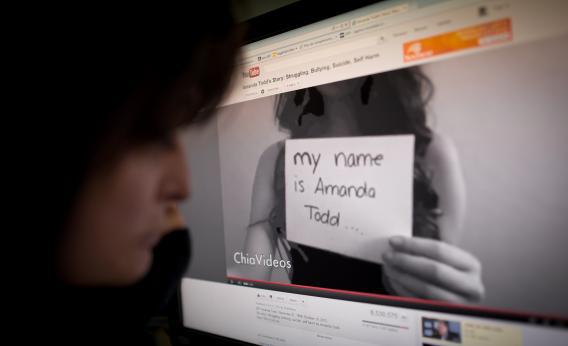Canadian teen Amanda Todd was pretty, caring, lonely, and bullied. Ultimately, the bullying cost the 15-year-old her life.
Reportedly, someone online convinced her to send him pictures of herself, and he then sent the images to friends and family. Thus began the real-life bullying from her peers, separate from but feeding off of the online bullying she was already enduring. In early September she posted a video cry for help to YouTube—but it also became a target for attack. Finally, on Oct. 10, she took her own life.
The case inspired outrage around the world. She did everything right: asking for help, relying on friends and family, getting psychiatric help. But she still fell victim to someone else’s recreational hatred. The Royal Canadian Mounted police put an estimated two dozen officers on the case to find the man who victimized her, but had not announced any leads or suspects as of Monday.
Enter Anonymous.
The police may have been playing things close to the bullet-proof vest, but Anonymous is something else entirely. On Monday night, they released a roundup of personal information—that is, they “doxed”—a Vancouver-area man, claiming he was the one behind Todd’s suicide. They released a cache of identifying information including his Facebook, Twitter, and Google+ accounts, links to his accounts at perv sites like Jailbait, photos, chat transcripts, and home address. And, as is traditional, a bombastic “Expect Us” video.
The Internet cheered. The media made house calls. And the RCMP reportedly dispatched two squad cars to the house in case someone decided to go vigilante IRL.
Only one problem: wrong house.
“Please quit posting the address for the guy in [New] Westminster. This is NOT the correct person,” posted Anonymous New Jersey on their popular Facebook page. To be more precise, they had identified who they believe is the right person, but he didn’t live at that address, as the bewildered resident informed the media. Radio station CKNW reported that the police concluded the occupants were at no risk.
Anonymous got some other details wrong, too. The subject is reportedly 19 years old, not 32, as was initially claimed. The RCMP, meanwhile, told News1130 radio that the allegations by Anonymous were unfounded. (He was reportedly in court, however, accused of sexual assault and sexual interference of a person under 16.) He told CTV reporter Lisa Rossington that he knew Todd, but claimed to be a friend of hers who was trying to find her stalker, a man he claimed lived in the US. He said he’d given the tip to the RCMP already.
For good measure, Anonymous then doxed the man whom their original suspect fingered as the culprit.
Has Anonymous identified the criminal perpetrator of this fatal stalking? If they have, has their public identification of him prejudiced his right to a fair trial? If they have not, what will the long-term repercussions be for a young man not yet 20?
Even if he is not the person who helped goad Todd into suicide, there’s a good case to be made that he is not a stellar citizen, it seems: MetroNews is reporting that in 2010 the man (then a juvenile) was nominated for “Blackmailer of the Year” on the Capper Awards, which reward men who bully or coax young girls into taking off their clothes on camera. (I understand if you want to pause for a de-lousing at this point.)
The mere threat of “doxing” is enough to intimidate even hardened trolls, as they contemplate having to live with the reputations they earned under a carefully-chosen pseudonym. Between this and the Violentacrez outing, it seems that the trolls are being flushed out from under their bridges. But when it comes to taking down people for their behavior online, how much due process do they deserve in the court of public opinion? And how much energy should be expended in either ensuring or preventing people from getting the reputations their actions deserve? Is vigilantism simply trolling in the name of justice?
